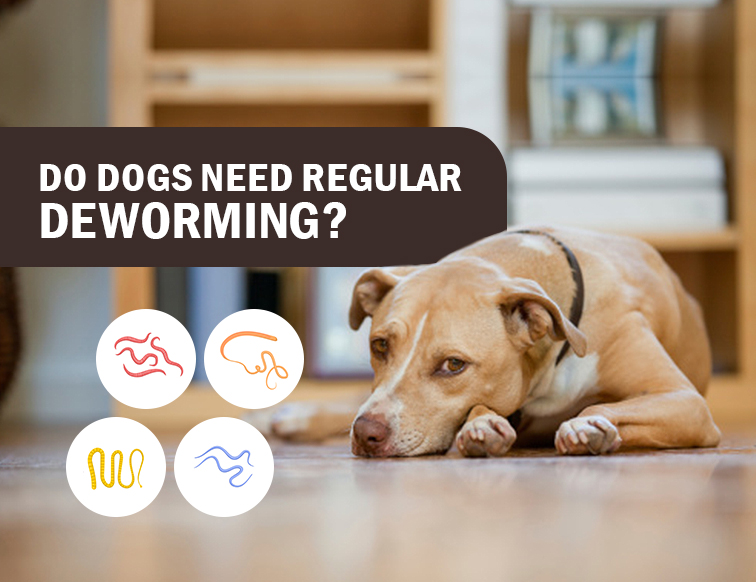If you want to use dog dewormers on your cat, it’s your wrong decision. because you cannot use dog dewormers on cats due to their different physiological requirements and sensitivity to certain ingredients.
Using the wrong type of dewormer can be harmful or even fatal to cats.
However, there are specific dewormers available for cats that are safe and effective in treating worm infections.
we will clear the concept and explore the reasons why you should never use dog dewormers on cats and the proper ways to deworm your feline companions.
It’s important to prioritize your cat’s health and well-being by following the correct guidelines for deworming treatments.
The Difference Between Dogs And Cats
Dogs and cats may appear similar in many ways, but when it comes to their physiology, they are quite different. Understanding these differences is crucial when it comes to choosing the right dewormer for your feline friend.
Let’s explore the key distinctions between dogs and cats and how these variations can impact the effectiveness of dewormers.
Highlighting The Physiological Differences Between Dogs And Cats:
- Metabolism: Cats have a more rapid metabolism compared to dogs, which can affect how their bodies process and respond to medications like dewormers. This disparity means that cat-specific dewormers are formulated to accommodate their unique metabolic rate.
- Liver function: The liver plays a significant role in metabolizing medications. Cats have specific liver enzymes that differ from those in dogs. This discrepancy can influence how dewormers are broken down and eliminated from the body.
- Sensitivity: Cats are known to be more sensitive to certain medications than dogs. It’s crucial to understand that using a dog dewormer on a cat can have adverse effects due to their varying sensitivity and susceptibility to certain ingredients.
Explaining How These Differences Can Impact The Effectiveness Of Dewormers:
- Dosage: The dosage of dewormers is determined based on the weight and metabolism of the animal. Since cats have faster metabolisms than dogs, a dewormer formulated for dogs may not provide the appropriate dosage for a cat. Using the wrong dosage can potentially lead to under or over-medication, rendering the dewormer ineffective or causing harm to the cat.
- Efficacy: Dewormers are designed to target specific parasites commonly found in dogs or cats. Due to the physiological differences between the two species, parasites that affect dogs may not be the same as those that affect cats. Using a dog dewormer on a cat may not effectively eliminate the specific parasites affecting them, as the formulation may not be tailored to their needs.
- Safety and side effects: Cats are known to be more sensitive to certain medications, and using a dog dewormer on them can pose safety concerns. Cats are more susceptible to adverse side effects such as gastrointestinal upset, allergic reactions, or even organ damage. It is essential to use dewormers specifically formulated for cats to ensure their safety and well-being.
Understanding the differences between dogs and cats is vital in choosing the right dewormer for your feline friend.
Rather than risking their health by using a dog dewormer, consult with a veterinarian to find a suitable and effective deworming solution specifically designed for cats.
Your cat’s health is of utmost importance, and using the appropriate dewormer will ensure their well-being and protect them from harmful parasites.
Common Types Of Dewormers For Dogs
When it comes to keeping our furry companions healthy, preventing and treating internal parasites is crucial. Deworming is an essential part of pet care, focusing on eliminating or reducing intestinal worms.
While there are specific dewormers specifically formulated for dogs and cats, it’s important to know that dog dewormers should never be used on cats, as they contain different active ingredients that can be harmful to felines.
In this section, we will discuss the most commonly used dewormers for dogs, exploring their ingredients and mode of action.
Discussing The Most Commonly Used Dewormers For Dogs:
- Praziquantel:
- This ingredient is effective against tapeworms.
- It works by causing severe contractions and paralysis of the parasites, ultimately leading to their elimination.
- Praziquantel is widely used in combination with other deworming medications to provide broad-spectrum coverage.
- Pyrantel pamoate:
- Pyrantel pamoate is commonly used to target hookworms and roundworms.
- It works by paralyzing the worms’ nervous system, which then allows the dog’s body to expel them naturally through bowel movements.
- This dewormer is usually available in chewable tablet form, making it easy to administer to dogs.
- Fenbendazole:
- Fenbendazole is effective against a variety of gastrointestinal parasites, including whipworms, hookworms, roundworms, and certain protozoa.
- It interferes with the worms’ energy metabolism, preventing their ability to survive and reproduce.
- This dewormer is often administered over several days to ensure the elimination of all stages of the parasites.
- Milbemycin oxime:
- Milbemycin oxime is primarily used to target heartworm disease, but it also provides protection against certain intestinal worms.
- It works by disrupting the worm’s nerve transmissions, causing paralysis and eventual death.
- This dewormer is commonly available in a flavored chewable tablet form, making it easy to administer to dogs.
Remember, it’s crucial to always consult with your veterinarian before administering any deworming treatment to your dog.
They will be able to recommend the most suitable dewormer based on your dog’s specific needs and ensure the correct dosage is administered.
Dewormers Safe For Both Dogs And Cats
Identifying Dewormers That Are Safe For Both Dogs And Cats
Keeping our pets healthy and free from parasites is a top priority for every pet owner. When it comes to deworming, it’s important to choose a product that is safe for both dogs and cats. Luckily, there are dewormers available that can effectively eliminate parasites in both our canine and feline companions.
Let’s dive into the key points of identifying dewormers that are safe for both dogs and cats.

Dewormers that are safe for both dogs and cats offer convenience for pet owners with multi-pet households. Here are some key points to consider when looking for these types of dewormers:
- Broad-spectrum ingredients: Look for dewormers that contain broad-spectrum active ingredients. These ingredients target multiple types of parasites, ensuring comprehensive protection for both dogs and cats. Common active ingredients include pyrantel pamoate, praziquantel, and fenbendazole.
- Veterinarian recommendation: Before administering any dewormer to your pets, it’s highly recommended to consult with your veterinarian. They can provide guidance on the most appropriate dewormer for your specific pets, taking into account their age, weight, and overall health condition.
- Dosage and administration: Dewormers for dogs and cats often differ in dosage and administration. Be sure to carefully read the instructions and follow the recommended dosage guidelines based on the weight and size of your pet. Never administer a dog dewormer to your cat without the veterinarian’s approval, as it can be harmful.
- Safety precautions: Just like with any medication, there may be potential side effects or contraindications to consider. Always check the label and packaging for any warnings or precautions. If you notice any adverse reactions in your pet after administering the dewormer, stop use immediately and consult your veterinarian.
- Regular preventative care: Alongside deworming, it’s essential to establish a regular preventative care routine for your pets. This includes regular check-ups with your veterinarian, routine vaccinations, and a balanced diet. Regular deworming should also be included in this preventative care plan to keep both dogs and cats in optimal health.
Identifying dewormers that are safe for both dogs and cats can provide a convenient and effective solution for pet owners. By choosing a broad-spectrum dewormer, consulting with your veterinarian, and following the dosage and safety guidelines, you can ensure the health and well-being of your furry friends.
Remember, prevention is key when it comes to protecting your pets from parasites, and regular deworming should be part of their overall care routine.
Potential Risks Of Using Dog Dewormers On Cats
Using dog dewormers on cats may seem like a convenient solution, especially if you have both pets at home and want to save some money. However, it’s crucial to understand that dogs and cats have different physiological needs, which extends to their medications.
When it comes to dewormers, using dog-specific products on cats can pose potential risks and side effects. It’s important to highlight these risks and stress the importance of consulting a veterinarian before administering any medication.
Using dog dewormers on cats can lead to various adverse effects, including:
- Incorrect dosage: Dog dewormers are formulated for the specific weight and needs of dogs. Administering these medications to cats can result in inappropriate dosing, leading to either underdosing or overdosing.
- Unsafe ingredients: Dog dewormers may contain active ingredients that are safe for dogs but can prove harmful to cats. Cats are more sensitive to certain chemicals, which can cause toxicity or severe allergic reactions.
- Ineffectiveness: Dog dewormers are designed to target parasites commonly found in dogs and may not effectively eliminate parasites that are specific to cats.
- Digestive upsets: Cats have a more delicate digestive system than dogs. The ingredients in dog dewormers can cause stomach upset, vomiting, or diarrhea in cats.
- Neurological issues: Some dog-specific dewormers contain compounds that can negatively affect a cat’s central nervous system, leading to tremors, seizures, or other neurological issues.
It’s essential to remember that cats and dogs have distinct metabolic processes. Administering the wrong medications can have severe consequences for your feline companion.

Consulting a veterinarian is crucial before making any decisions regarding deworming your cat. They can provide the necessary guidance and prescribe the appropriate dewormers based on your cat’s weight, health condition, and specific type of parasites.
Taking this step will ensure the well-being and safety of your beloved pet.
Canine-Specific Dewormers And Their Incompatibility With Cats
Exploring Dewormers That Are Specifically Formulated For Dogs And Their Incompatibility With Cats
Deworming your pets is an essential part of their healthcare routine. As responsible pet owners, we want to ensure that our furry friends are free from harmful internal parasites. But can you use dog dewormer on cats? The short answer is no.
Let’s dive deeper into the reasons behind this incompatibility.
Canine-Specific Dewormers:
- Made specifically for dogs
- Target parasites that commonly affect dogs
- Formulated with ingredients safe for dogs
Incompatibility With Cats:
- Cats have different metabolic rates and sensitivities compared to dogs
- Certain ingredients in dog dewormers can be toxic to cats
- Cats may experience adverse reactions or even serious health consequences if given dog dewormers
It is crucial to understand the specific needs and requirements of each pet when it comes to their healthcare. While dog dewormers may seem similar to cat dewormers, it is essential to always use the appropriate deworming treatment for your furry companion.
Read Also: How To comfort a dog with pancreatitis
Consulting with your veterinarian is the best way to determine the most suitable deworming solution for your cat. Your veterinarian will consider your cat’s health history and specific needs to prescribe a safe and effective dewormer.
Remember, the well-being of our pets is of utmost importance, and using the right deworming treatment is vital to ensure their health and happiness.
Cat-Specific Dewormers And Their Benefits
Can You Use Dog Dewormer On Cats
If you’re a cat owner, you know that protecting your feline friend from harmful parasites is a top priority. Worms are a common issue that can affect cats of all ages, and while dog dewormers may seem like a viable solution, it’s important to note that cats have different needs when it comes to deworming.
That’s where cat-specific dewormers come into play. These specialized medications are formulated exclusively for cats and offer several benefits that can effectively treat feline worms. Let’s explore the key points:
Identifying Dewormers That Are Formulated Exclusively For Cats
- Cat-specific dewormers are specifically formulated for the unique physiology of cats, ensuring their safety and effectiveness in treating feline worms.
- These dewormers are designed to target and eliminate specific types of worms that commonly affect cats, such as roundworms, hookworms, and tapeworms.
- Unlike dog dewormers, cat-specific dewormers are carefully dosed to suit the size and weight of a feline, reducing the risk of overdose and adverse reactions.
- These dewormers come in various forms, including tablets, topical solutions, and oral suspensions, making it easier for cat owners to administer the medication to their furry companions.
Highlighting Their Benefits And Effectiveness In Treating Feline Worms
- Cat-specific dewormers are highly effective in eliminating worms and preventing reinfestation, ensuring the overall health and well-being of your cat.
- By treating and eliminating worms, these medications help alleviate discomfort and symptoms associated with worm infestation, such as diarrhea, vomiting, weight loss, and poor coat condition.
- Some cat-specific dewormers also have additional benefits, such as providing protection against fleas, ticks, and other parasites that can pose a threat to your cat’s health.
- Regular use of cat-specific dewormers can help prevent the transmission of certain types of worms from cats to humans, reducing the risk of zoonotic infections.
When it comes to deworming your cat, using a dewormer specifically formulated for cats is crucial. These medications offer targeted treatment and ensure the safety and well-being of your feline friend.

Talk to your veterinarian to determine the most suitable cat-specific dewormer for your cat and follow the recommended dosage and administration instructions.
By incorporating regular deworming into your cat’s healthcare routine, you can ensure a parasite-free and healthier life for your beloved pet.
Consulting A Veterinarian: The Right Path
Deworming cats is an essential part of maintaining their overall health and well-being. While there are several deworming products available in the market for cats, it’s crucial to consult a veterinarian before administering any medication.
Veterinarians are trained professionals who play a vital role in determining the best deworming treatment for cats.
They have the knowledge and expertise to evaluate the cat’s health condition and prescribe the most suitable dewormer. Seeking professional advice from a veterinarian is paramount to ensure the safety and effectiveness of the treatment.
Read Also: Why Do Dogs Have Ridges on Their Lips
Let’s dive deeper into the importance of consulting a veterinarian when it comes to deworming your furry feline friend.
Emphasizing The Importance Of Seeking Professional Advice From A Veterinarian
- Expert guidance: Veterinarians have extensive knowledge and experience in dealing with various health conditions in cats, including parasite infestations. Consulting them ensures that your cat’s deworming treatment is accurate and appropriate for their specific needs.
- Accurate diagnosis: Veterinarians conduct thorough examinations and, if necessary, perform diagnostic tests to identify the type and severity of the parasite infestation. Their expertise enables them to differentiate between different parasites and select the most effective treatment.
- Choosing the right dewormer: With a plethora of deworming products available, it can be challenging to determine which one is suitable for your cat. Veterinarians have up-to-date information about the latest deworming medications and can recommend the most appropriate one based on your cat’s age, weight, and overall health.
- Dosage and administration: A veterinarian will provide precise instructions on the correct dosage and administration method for the dewormer. They take into account your cat’s individual needs, ensuring both safety and effectiveness.
- Monitoring and follow-up: Following deworming treatment, veterinarians can monitor your cat’s progress and provide guidance on any necessary follow-up steps, including additional treatments or preventive measures. Their expertise ensures that your cat remains healthy and free from parasites in the long run.
Remember, when it comes to your cat’s health, it’s always wise to consult a veterinarian. Their professional advice and guidance will ensure that your cat receives the most suitable and effective deworming treatment, promoting their overall well-being.
Alternative Solutions For Deworming Cats
Exploring Alternative Methods For Deworming Cats
If you’re a cat owner, you may wonder if it’s safe to use dog dewormer on your furry feline.
While it may be tempting to reach for the same dewormer you use for your dog, it’s important to remember that cats have different needs and sensitivities.
Fortunately, there are alternative solutions for deworming cats that can be both effective and safe. Let’s explore some of these options:
Natural Remedies For Deworming Cats:
- Pumpkin seeds: These seeds contain an amino acid called cucurbitacin, which has been found to paralyze worms and prevent them from attaching to the intestines. To use pumpkin seeds as a dewormer, grind them into a fine powder and mix a small amount into your cat’s food.
- Diatomaceous earth: This fine powder is made from the fossilized remains of tiny aquatic organisms and is effective at killing parasites by dehydrating them. Sprinkle a small amount of food-grade diatomaceous earth on your cat’s food or mix it with water and administer it directly into their mouth.
- Herbal remedies: Certain herbs, such as wormwood, black walnut, and clove, have been traditionally used to treat intestinal parasites in cats. These herbs can be found in supplement form or as part of a specially formulated deworming product for cats.
Preventive Measures For Deworming Cats:
- Regular vet check-ups: Schedule regular visits to your vet for deworming and overall health assessment. Your vet can recommend the appropriate deworming treatment based on your cat’s specific needs.
- Proper sanitation: Keep your cat’s living area clean and free from feces, as parasites can be spread through contaminated soil or litter. Regularly clean and disinfect their litter box, bedding, and surrounding areas.
- Flea control: Fleas can carry tapeworm eggs, which can be ingested by cats during grooming. Use flea prevention products recommended by your vet to reduce the risk of worm infestations.
Remember, it’s always best to consult with your veterinarian before trying any alternative deworming methods. They can provide guidance based on your cat’s health, age, and specific parasite concerns.

By exploring natural remedies and implementing preventive measures, you can help keep your beloved feline companion happy, healthy, and free from pesky worms.
Frequently Asked Questions
Can You Use Dog Dewormer On Cats?
Using dog dewormer on cats is not recommended. Cats and dogs have different metabolisms and can tolerate different medications. Some dog dewormers can be toxic to cats and can cause serious health problems. It’s best to consult a veterinarian for the appropriate deworming treatment for your cat.
What Happens If You Give A Cat Dog Dewormer?
Giving a cat dog dewormer can be dangerous and potentially life-threatening. Dog dewormers contain ingredients that are intended for dogs and may be toxic to cats. These ingredients can cause adverse reactions, such as vomiting, diarrhea, seizures, and even organ damage.
Always use dewormers specifically formulated for cats.
Are There Dewormers Safe For Both Dogs And Cats?
Yes, there are dewormers that are safe and effective for both dogs and cats. These dewormers are specifically formulated to meet the needs of both species and are safe to use in either one. It’s important to follow the instructions and dosage recommendations provided by your veterinarian or the product label.
Can I Use A Natural Dewormer For My Cat?
Natural dewormers for cats can be effective in some cases, but it’s important to note that not all natural remedies are safe or effective. Consult with your veterinarian before using any natural dewormer to ensure it is safe for your cat and will effectively treat the specific type of worms your cat may have.
How Often Should You Deworm Your Cat?
The frequency of deworming your cat depends on various factors, such as their lifestyle, potential exposure to parasites, and the specific deworming product used. In general, it is recommended to deworm kittens every 2 weeks until they are 8 weeks old, and then every 1-3 months for adult cats.

However, it’s best to consult your veterinarian for personalized advice based on your cat’s individual needs.
Conclusion
To summarize, can i use dog dewormer on cats? it is not recommended to use dog dewormer on cats. While the active ingredients may be similar, the dosage and formulation of these dewormers are specifically designed for each animal’s needs.
Cats have a different metabolism and are more sensitive to certain chemicals than dogs.
Using a dog dewormer on cats can result in severe adverse effects, including toxicity and even death. It is always best to consult with a veterinarian who can prescribe the appropriate dewormer for your cat’s specific condition.
They will consider the cat’s age, weight, and any other underlying health issues before recommending the most effective and safe treatment.
So, to ensure the well-being of your furry friend, it is crucial to use only products formulated specifically for cats and seek professional advice when it comes to deworming and any other medical treatments.
Read Also Other Post:
Effective Tips To Remove Dog Pee Smell from Vinyl Flooring
How Long Can Hot Dogs Sit Out Before Go Bad
How to Throw Off a Drug Dogs Scent | 5 Expert Tips
What Does Ringworm On a Dog Look Like
- Smelly House Because of Dog? Take These Hygiene Tips - May 20, 2025
- How to Introduce a Dog To a Cats Without Chaos - May 6, 2025
- 4 Best Cavapoo Rescues in the UK 2024 - April 5, 2024








